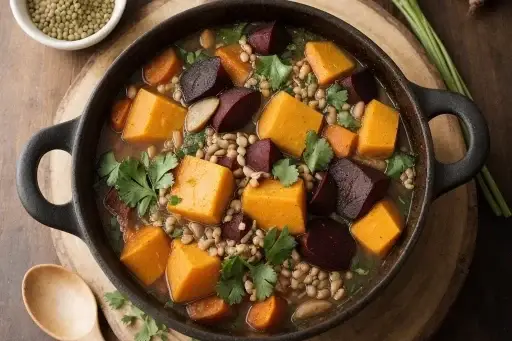Welcome to WellHealthOrganic.com, your trusted source for holistic wellness and Ayurvedic wisdom. In this comprehensive guide, we delve into the transformative power of Ayurvedic dinners, offering insights, recipes, and tips to help you nourish your body, mind, and soul. From understanding the principles of Ayurveda to creating balanced and healing meals, discover how Ayurvedic dinners can support your journey to optimal health and vitality.
Unlocking the Wisdom of Ayurvedic Dinners
Ayurveda, the ancient science of life, offers a holistic approach to well-being that emphasizes harmony and balance in all aspects of life, including diet and nutrition. Ayurvedic dinners are thoughtfully crafted meals designed to nourish the body, support digestion, and promote overall vitality. By incorporating Ayurvedic principles into your dinner routine, you can align with the natural rhythms of the seasons, optimize digestion, and cultivate vibrant health from within.
Key Principles of Ayurvedic Dinners:
- Balancing the Doshas: Ayurveda recognizes three primary doshas—Vata, Pitta, and Kapha—that govern the physiological and psychological aspects of our being. Ayurvedic dinners are tailored to balance your unique doshic constitution, ensuring harmony and equilibrium within the body.
- Seasonal Eating: Ayurveda emphasizes the importance of eating seasonally to align with the cyclical rhythms of nature. By consuming fresh, locally sourced ingredients that are in season, you can optimize nutrient intake, support digestive health, and promote overall well-being.
- Six Tastes Principle: Ayurveda recognizes six tastes—sweet, sour, salty, bitter, pungent, and astringent—and advocates for incorporating a balance of these tastes into each meal. By including a variety of flavors in your Ayurvedic dinners, you can satisfy the palate, promote optimal digestion, and support overall satisfaction.
- Mindful Eating Practices: Ayurveda encourages mindful eating practices, including eating in a calm and peaceful environment, chewing food thoroughly, and savoring each bite. By cultivating awareness around your eating habits, you can enhance digestion, reduce stress, and promote greater satisfaction and contentment.
Creating Your Ayurvedic Dinner:
- Assess Your Dosha: Begin by determining your dominant dosha—Vata, Pitta, or Kapha—to tailor your Ayurvedic dinner to your unique constitution. This will help you select foods and flavors that support balance and harmony within your body.
- Select Seasonal Ingredients: Choose fresh, organic ingredients that are in season and resonate with your doshic constitution. Incorporate a variety of fruits, vegetables, whole grains, legumes, nuts, seeds, and spices to create a well-rounded and nourishing meal.
- Balance Your Plate: Aim to include a balance of carbohydrates, proteins, and healthy fats in your Ayurvedic dinner to support sustained energy and satisfaction. Experiment with different combinations of ingredients to create a diverse and satisfying meal that appeals to all six tastes.
- Cook with Ayurvedic Spices: Enhance the flavor and therapeutic properties of your Ayurvedic dinner by incorporating Ayurvedic spices such as turmeric, ginger, cumin, coriander, cinnamon, and cardamom. These spices not only add depth and complexity to your dishes but also offer a wide range of health benefits.
- Practice Mindful Eating: Take time to sit down and enjoy your Ayurvedic dinner in a calm and relaxed environment. Chew your food slowly and mindfully, savoring the flavors and textures with each bite. Pay attention to hunger and satiety cues, and stop eating when you feel comfortably full.
Sample Ayurvedic Dinner Recipes:
- Vata-Balancing Dinner: Warm and grounding lentil stew with root vegetables, steamed kale with ghee and toasted sesame seeds, and quinoa pilaf with warming spices like cinnamon and cloves.
- Pitta-Soothing Dinner: Cooling cucumber and mint salad with lime dressing, grilled tofu with cilantro and coconut chutney, and basmati rice with fresh herbs and a squeeze of lemon.
- Kapha-Stimulating Dinner: Spicy chickpea curry with ginger and turmeric, roasted Brussels sprouts with mustard seeds and chili flakes, and millet pilaf with roasted vegetables and a sprinkle of parsley.
Ayurvedic Principles For Dinner
1. Eat Light and Easy to Digest Dinner:

Ayurveda suggests that our digestive fire (Agni) is weaker in the evening. Hence, dinners should be lighter compared to lunch, ensuring they can be easily digested before bedtime. This aids in promoting a good night’s sleep and overall well-being.
2. Eat Well Cooked and Warm Dinner

Ayurveda recommends warm, cooked food in the evening to appease the digestive system and promote maximal nutrient absorption
3. Dosha Balancing:
Knowing your dominant dosha and choosing the right kind of food can therefore be a great key to keeping good health. For example, Vata does much better with grounding, moist, and warming foods. Pitta does much better with cooling and calming meals, and Kapha with light, exciting dishes.
Ayurvedic Dinner Ideas
1. Vata-Balancing Stew:

Have a meal, say, the nourishing stewed root vegetables (for example, sweet potatoes, carrots, and beets), together with the mung beans and warming spices (for example, ginger and cumin). Take all these, grounding and moist—perfect to counter the dry and light qualities of Vata.
2. Pitta-Pacifying Khichdi:

Khichdi is a traditional Indian food made from rice and lentils. It pacifies Pitta. The best way to prepare it is to add cooling spices like fennel and coriander, along with vegetables such as zucchini and kale to it, to make it wholesome and light for the digestive system.
3. Kapha-Invigorating Barley Soup:

Barley soup in a light vegetable broth, with leafy vegetables like spinach and some exciting spices such as black pepper and turmeric, can be good for Kapha without overburdening the system.
4. Tri-Dosha Balancing Quinoa Pilaf:

A quinoa pilaf, when combined with seasoned veggies like carrots, peas, and asparagus, mixed with mild spices like turmeric and coriander, and topped with a squeeze of fresh lime juice, would be ideal in balancing all the three doshas and hence can be perfect for a family having varied body types.
Conclusion
Embrace the ancient wisdom of Ayurveda and nourish your body, mind, and soul with Ayurvedic dinners. By incorporating Ayurvedic principles into your dinner routine, you can support digestive health, balance the doshas, and cultivate greater well-being from within. Explore the delicious and healing world of Ayurvedic dinners today and embark on a journey to vibrant health and vitality with WellHealthOrganic.com as your guide.